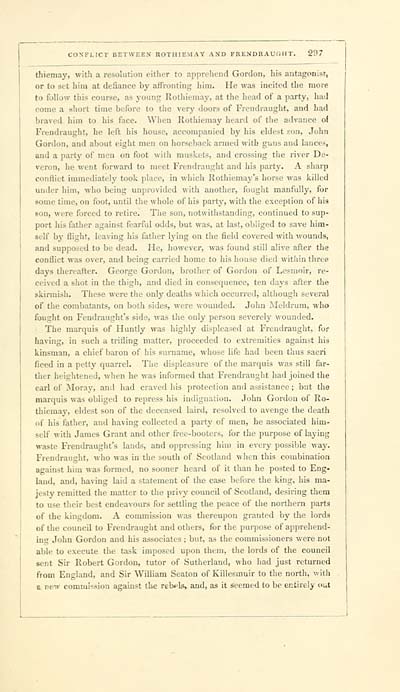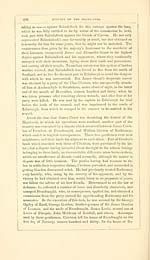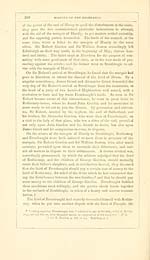Download files
Complete book:
Individual page:
Thumbnail gallery: Grid view | List view

CONFLICT BETWEEN ROTHIEMAY AND FRENDRAUGHT. 297
thieniay, with a resolution either to apprelieiid Gordon, his antagonist,
or to set him at defiance by affronting liim. He was incited the more
to follow this course, as j'oung Rothieniay, at the head of a party, had
come a short time before to tlie very doors of Frondraught, and had
braved him to his face. When Rothiemay Iieard of the advance ol
Frendraught, he left his house, accompanied by his eldest son, John
Gordon, and about eight men on liorseback armed with guns and lances,
and a party of men on foot with muskets, and crossing the river De-
veron, he went forward to meet Frendranglit and his party. A sharp
conflict immediately took place, in which Rothiemay 's horse was killed
under him, who being unprovided with another, fought manfully, for
some time, on foot, until the whole of his party, with the exception of his
son, were forced to retire. The son, notwithstanding, continued to sup-
port his father against fearful odds, but w;is, at last, obliged to save him-
self by flight, leaving his father lying on the field covered with m ounds,
and supposed to be dead. He, however, was found still alive after the
conflict was over, and being carried home to his house died within three
days thereafter. George Gordon, brother of Gordon of Lesraoir, re-
ceived a shot in the thigh, and died in consequence, ten days after the
skirmish. These were tlie only deaths which occurred, although several
of the combatants, on both sides, were wounded. John Meldrum, who
fought on Fendraught's side, was tlie only person severely wounded.
The marquis of Huntly was highly displeased at Frendraught, for
having, in such a trifling matter, proceeded to extremities against his
kinsman, a chief baron of his surname, whose life had been th\is sacri
(iced in a petty quarrel. The displeasure of the marquis was still far-
ther heightened, when he was informed that Frendraught had joined the
earl of Moray, and had craved his protection and assistance ; bat the
marquis was obliged to repress his indignation. John Gordon of Ro-
thiemay, eldest son of the deceased laird, resolved to avenge the death
of his father, and having collected a party of men, he associated him-
self with James Grant and other free-booters, for the purpose of laying
waste Frendraught's lands, and oppressing him in every possil^le \vay.
Frendraught, who was in the south of Scotland when this combination
against him was formed, no sooner heard of it tlian he posted to Eng-
land, and, having laid a statement of the case before the king, his ma-
jesty remitted the matter to the privy council of Scotland, desiring them
to use their best endeavours for settling the peace of the northern parts
of the kingdom. A commission was thereupon granted by the lords
of the council to Frendraught and others, for the purpose of apprehend-
ing John Gordon and his associates ; but, as the commissioners were not
able to execute the task imposed upon them, the lords of the council
sent Sir Robert Gordon, tutor of Sutherland, who had just returned
from England, and Sir William Seaton of Killesmuir to the north, with
El new commission against the reb^-lsv and, as it seemed to be entirely oui
thieniay, with a resolution either to apprelieiid Gordon, his antagonist,
or to set him at defiance by affronting liim. He was incited the more
to follow this course, as j'oung Rothieniay, at the head of a party, had
come a short time before to tlie very doors of Frondraught, and had
braved him to his face. When Rothiemay Iieard of the advance ol
Frendraught, he left his house, accompanied by his eldest son, John
Gordon, and about eight men on liorseback armed with guns and lances,
and a party of men on foot with muskets, and crossing the river De-
veron, he went forward to meet Frendranglit and his party. A sharp
conflict immediately took place, in which Rothiemay 's horse was killed
under him, who being unprovided with another, fought manfully, for
some time, on foot, until the whole of his party, with the exception of his
son, were forced to retire. The son, notwithstanding, continued to sup-
port his father against fearful odds, but w;is, at last, obliged to save him-
self by flight, leaving his father lying on the field covered with m ounds,
and supposed to be dead. He, however, was found still alive after the
conflict was over, and being carried home to his house died within three
days thereafter. George Gordon, brother of Gordon of Lesraoir, re-
ceived a shot in the thigh, and died in consequence, ten days after the
skirmish. These were tlie only deaths which occurred, although several
of the combatants, on both sides, were wounded. John Meldrum, who
fought on Fendraught's side, was tlie only person severely wounded.
The marquis of Huntly was highly displeased at Frendraught, for
having, in such a trifling matter, proceeded to extremities against his
kinsman, a chief baron of his surname, whose life had been th\is sacri
(iced in a petty quarrel. The displeasure of the marquis was still far-
ther heightened, when he was informed that Frendraught had joined the
earl of Moray, and had craved his protection and assistance ; bat the
marquis was obliged to repress his indignation. John Gordon of Ro-
thiemay, eldest son of the deceased laird, resolved to avenge the death
of his father, and having collected a party of men, he associated him-
self with James Grant and other free-booters, for the purpose of laying
waste Frendraught's lands, and oppressing him in every possil^le \vay.
Frendraught, who was in the south of Scotland when this combination
against him was formed, no sooner heard of it tlian he posted to Eng-
land, and, having laid a statement of the case before the king, his ma-
jesty remitted the matter to the privy council of Scotland, desiring them
to use their best endeavours for settling the peace of the northern parts
of the kingdom. A commission was thereupon granted by the lords
of the council to Frendraught and others, for the purpose of apprehend-
ing John Gordon and his associates ; but, as the commissioners were not
able to execute the task imposed upon them, the lords of the council
sent Sir Robert Gordon, tutor of Sutherland, who had just returned
from England, and Sir William Seaton of Killesmuir to the north, with
El new commission against the reb^-lsv and, as it seemed to be entirely oui
Set display mode to: Large image | Transcription
Images and transcriptions on this page, including medium image downloads, may be used under the Creative Commons Attribution 4.0 International Licence unless otherwise stated. ![]()
| Early Gaelic Book Collections > Ossian Collection > History of the Highlands and of the Highland clans > Volume 1 > (411) |
|---|
| Permanent URL | https://digital.nls.uk/79677529 |
|---|
| Description | Vol. I. |
|---|---|
| Shelfmark | Oss.247 |
| Additional NLS resources: | |
| Attribution and copyright: |
|
| Description | Selected books from the Ossian Collection of 327 volumes, originally assembled by J. Norman Methven of Perth. Different editions and translations of James MacPherson's epic poem 'Ossian', some with a map of the 'Kingdom of Connor'. Also secondary material relating to Ossianic poetry and the Ossian controversy. |
|---|
| Description | Selected items from five 'Special and Named Printed Collections'. Includes books in Gaelic and other Celtic languages, works about the Gaels, their languages, literature, culture and history. |
|---|

